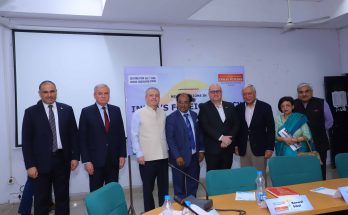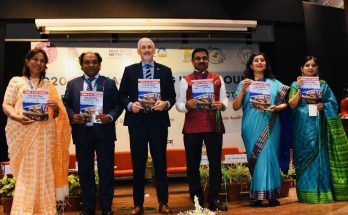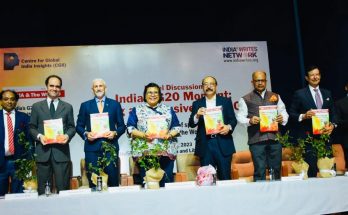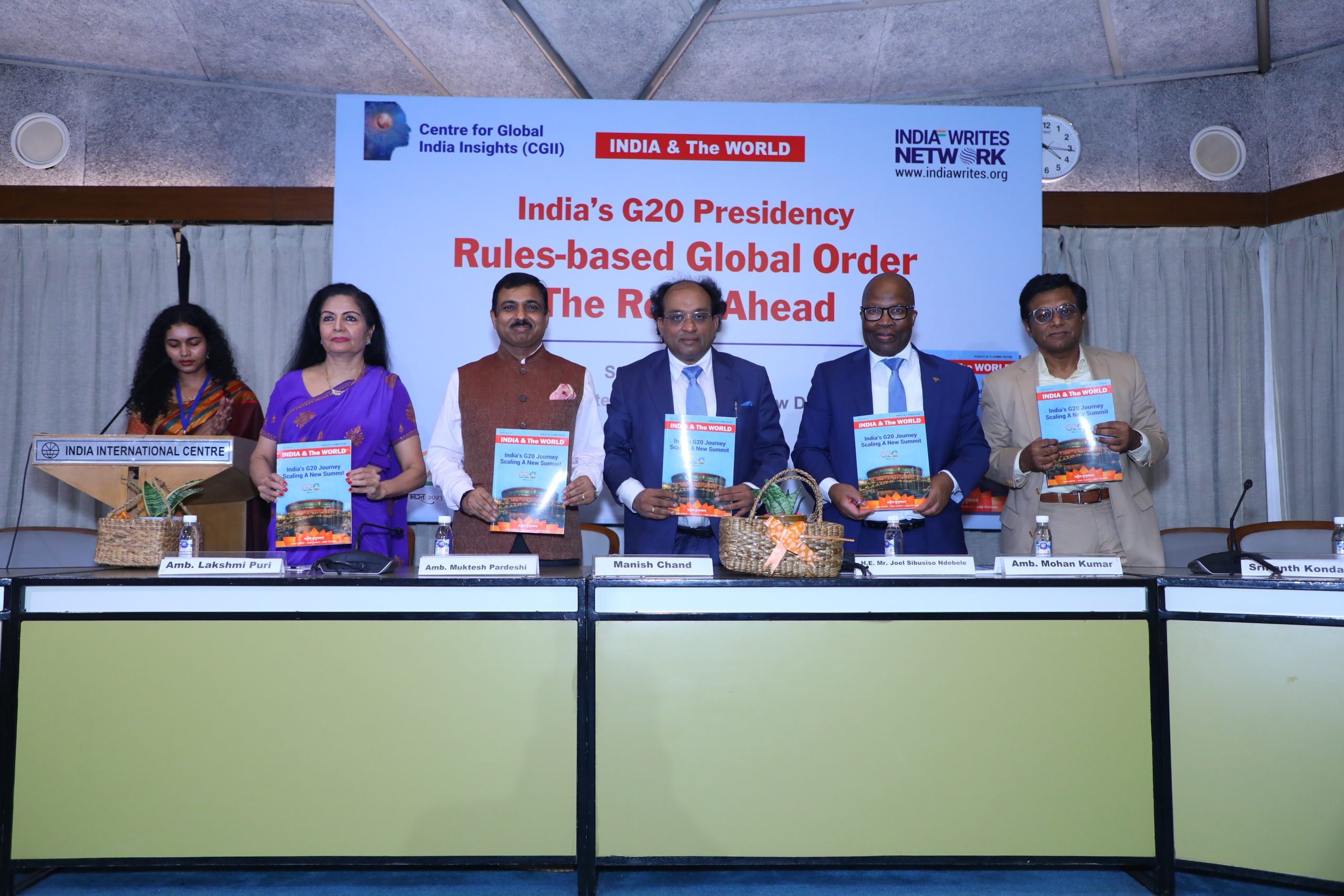
By Shweta Aggarwal
The G20 has a pivotal role to play in maintaining the rules-based global order, upholding freedom of navigation and reforming global governance, said eminent diplomats and experts at a conference on the outcomes of the G20 summit in New Delhi.
The G20 Summit in New Delhi was historic, productive and unprecedented in terms of outcomes, said Muktesh Pardeshi Special Secretary in charge of operations in the G20 Secretariat, Ministry of External Affairs, at a panel discussion on key outcomes of the September 9-10 G20 summit in New Delhi.

“India converted a diplomatic event into a people’s movement. It was a Chandrayaan landing moment for the foreign service,” said Mr Pardeshi. “G20 has touched the hearts of people – that’s the real success of our Presidency,” said Mr Pardeshi, who played a pivotal role in organising around 200 preparatory meetings in the run-up to the New Delhi summit.
The panel discussion, titled, “India’s G20 Presidency: Rules-based Global Order and The Road Ahead,” was organised by India Writes Network and Centre for Global India Insights (CGII), a think tank focused on global affairs, at India International Centre on September 14. Besides Pardeshi, eminent diplomats and experts who participated in the discussion included South Africa’s High Commissioner to India H.E. Mr. Joel Sibusiso Ndebele, Amb. Lakshmi Puri, Former UN diplomat and author, Amb. Mohan Kumar, India’s former Ambassador to France, Srikanth Kondapalli, Dean, SIS, Jawaharlal Nehru University. The conference was moderated and chaired by Manish Chand, CEO, India Writes Network & Director, Centre for Global India Insights.
China factor: Rules-based global order
Against the backdrop of China’s aggression in contested geographies such as the South China Sea, the role of the G20 in shaping an inclusive maritime order also figured prominently in discussions.
China was the elephant in the room (at the G20 summit in New Delhi). China holds the position of the largest trading partner for the majority of G20 nations, including the United States, the European Union, and several ASEAN countries,” Srikanth Kondapalli told the conference. Kondapalli highlighted that China does not follow the rules-based order, which was exemplified in Beijijng’s rejection of the South China Sea verdict by the Permanent Court of Arbitration in 2016.
By examining statements from high-ranking officials, Kondapalli underlined China’s historical reluctance towards adherence to established international norms. This perspective was placed in contrast to the prevailing ideals of the rules-based global governance system.
Prof. Kondapalli pointed out China’s reservations regarding certain aspects of the United Nations Convention on the Law of the Sea (UNCLOS), particularly its dispute resolution mechanism.
In his remarks, the author also focused on the environmental impact of China’s actions in the South China Sea. By engaging in extensive seabed dredging for construction purposes, China’s activities were shown to have far-reaching consequences, not only for the geopolitical landscape but also for the fragile marine ecosystem, he said.
“China does not follow a rules-based global order but they follow global governance. The rules-based order came only in 1945,” said Prof. Kondapalli. “China doesn’t want rules-based order but it wants global governance in which it is one of the permanent members of the United Nations Security Council so that it can push through global governance-related matters,” said Kondapalli, a well-known China expert.

In his scene-setting remarks, Manish Chand, CEO, India Writes Network and Director, CGII, termed the New Delhi summit “pathbreaking” and underscored that the whole world is looking at India anew as a rising global power. “The New Delhi summit has been applauded around the world for bridging divides and igniting hope in a ceaselessly conflicted world. The New Delhi summit has replaced 3Cs – Crisis, Conflict and Chaos – which dominated the international landscape with 3H – Healing, Hope and Harmony,” he said.
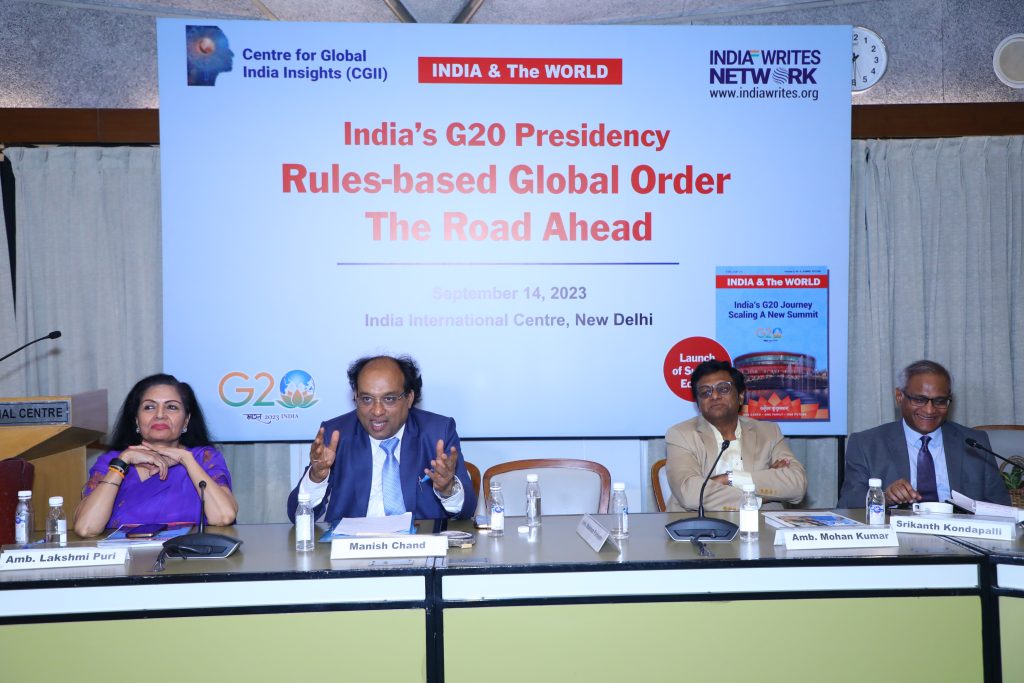
The Special Summit Edition of India and the World, titled India’s G20 Journey: Scaling a New Peak,” published by Inda Writes Network/TGII Media will also be unveiled at the conference.
Fast-tracking UN reforms

South Africa’s High Commissioner to India Joel Sibusiso Ndebele hailed India’s G20 presidency and the New Delhi summit for the inclusion of Africa in the G20 and putting the interests of the Global South on the G20 agenda. “The Global South ensured that the conflict in Ukraine did not derail the agenda of development envisioned by the Indian presidency,” said the envoy.
“We appreciate the contributions of the country of the South- Indonesia and Brazil- in assisting the chair in negotiating the text of most contentious paragraphs of the outcome document,” he said. “This is demonstrative of the soft power of the South in bridging the divides with G7 on the one hand and Russia and China on the other.”
“The UN risks being irrelevant till the Security Council is reformed. Asia and Africa can no longer be bystanders in global decision-making,” he stressed.
Mrs Lakshmi Puri, an ex-diplomat who worked with the UN for decades, underlined that the G20 summit “marked India’s emergence as a global system shaper, if not a system maker. In a sense, it’s coming of age for India.” “G20 summit in Delhi is blazing a trail and leaving a lasting legacy. Indians, of all hues, have applauded this. G20 participants as well as the world have stood up and really celebrated and applauded India,” said Mrs Puri, former Assistant Secretary General, United Nations and former Deputy Executive Director UN WOMEN.
Inclusive Indo-Pacific
Amb (Retd) Mohan Kumar spoke about the G20’s role in shaping an inclusive Indo-Pacific and suggested that the principles asserted in the paragraph related to Ukraine could also apply to the Indo-Pacific region. He pointed out that the New Delhi Declaration emphasized the importance of territorial integrity and adherence to international law. In a message to China, he cautioned against taking unilateral actions to change the status quo.
Mr Kumar also highlighted India’s evolving role from being a rule taker to a rule shaper in international affairs. While acknowledging that there is still progress to be made, the speaker emphasized that India has started to assert itself as a significant player in shaping global norms and principles.
(Hema Narang and Rishma Banerjee contributed inputs for this article)
Author Profile
- India Writes Network (www.indiawrites.org) is an emerging think tank and a media-publishing company focused on international affairs & the India Story. Centre for Global India Insights is the research arm of India Writes Network. To subscribe to India and the World, write to editor@indiawrites.org. A venture of TGII Media Private Limited, a leading media, publishing and consultancy company, IWN has carved a niche for balanced and exhaustive reporting and analysis of international affairs. Eminent personalities, politicians, diplomats, authors, strategy gurus and news-makers have contributed to India Writes Network, as also “India and the World,” a magazine focused on global affairs.
Latest entries
 In ConversationJuly 26, 2024India-Italy defence collaboration can extend to third countries: Anil Wadhwa
In ConversationJuly 26, 2024India-Italy defence collaboration can extend to third countries: Anil Wadhwa In ConversationJuly 23, 2024Italy views India as a key partner in Indo-Pacific: Vani Rao
In ConversationJuly 23, 2024Italy views India as a key partner in Indo-Pacific: Vani Rao DiplomacyJune 29, 2024First BRICS unveils a roadmap for boosting tourism among emerging economies
DiplomacyJune 29, 2024First BRICS unveils a roadmap for boosting tourism among emerging economies India and the WorldJune 11, 2024On Day 1, Jaishankar focuses on resolving standoff with China
India and the WorldJune 11, 2024On Day 1, Jaishankar focuses on resolving standoff with China




